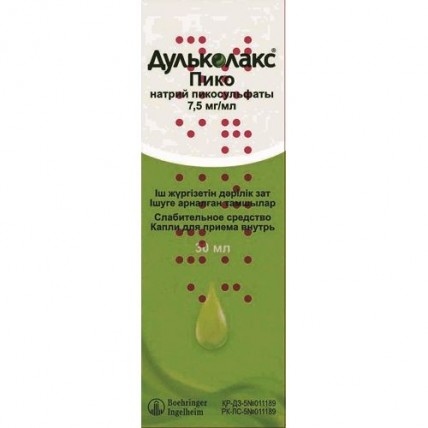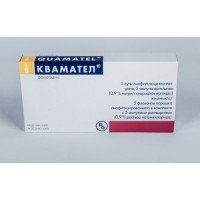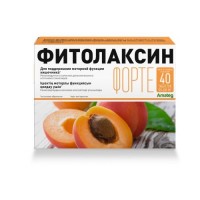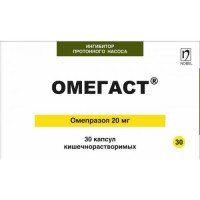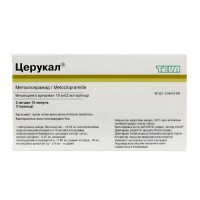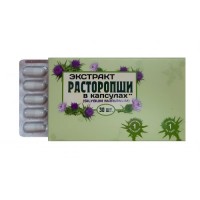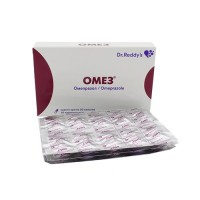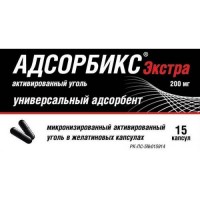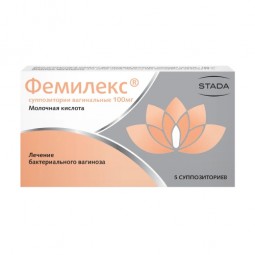Dulcolax® pico 7.5 mg / ml 30 ml oral drops
- $17.50
The instruction for medical
use
of Dulkolaks® medicine of Piko
the Trade name
of Dulkolaks Piko Mezhdunarodnoye the unlicensed name
of Sodium pikosulfat
the Dosage form
of the Drop for intake of 7.5 mg/ml 15 ml, 30 ml
Structure
of 100 ml of drug contain
active agent - sodium of the pikosulfat of monohydrate of 7.5 mg,
excipients: Natrium benzoicum, sorbitol which liquid is (not crystallized) citrate sodium a dihydrate, citric acid monohydrate, water purified.
The description
Transparent, from colourless till yellow or light-yellowy-brown color, slightly viscous solution with almost imperceptible smell
Pharmacotherapeutic group
Laxatives. Contact laxatives.
Sodium pikosulfat.
ATX A06AB08 code
Pharmacological
Pharmacokinetics Absorption properties. After sodium intake pikosulfat reaches a large intestine, without being soaked up from digestive tract and, thus, without being exposed to hepatoenteric circulation.
Biotransformation. Sodium pikosulfat the encore - (r-hydroxyphenyl)-pyridyl-2-methane in a distal segment of intestines by splitting will be transformed by colibacilli to active compound of drug.
Elimination. After transformation only a small amount the encore - (r-hydroxyphenyl)-pyridyl-2-methane is soaked up and connects in a wall of intestines and liver to formation of an inactive glucuronide an encore - (r-hydroxyphenyl)-pyridyl-2-methane. After intake of 10 mg of sodium of the pikosulfat of 10.4% of the general dose the encore - (r-hydroxyphenyl)-pyridyl-2-methane with urine in 48 hours is removed in the form of a glucuronide. Generally, removal with urine decreases when is accepted higher doses of sodium of the pikosulfat.
Time of development of laxative effect of drug is defined by the speed of release of an active metabolite and is 6-12 hours. The direct or return interrelation between laxative effect of an active metabolite and its concentration in blood serum is absent.
A pharmacodynamics
Pikosulfat of sodium, active component of the drug Dulkolaks Piko – locally operating depletive from triarilmetanovy group. After bacterial splitting stimulates her mucous membrane in a large intestine, reduces absorption of electrolytes and water, strengthens an intestines vermicular movement.
The active form of drug which is formed by hydrolysis under the influence of intestinal microorganisms directly excites nervous structures of an intestinal wall therefore advance of intestinal contents accelerates.
As the laxative operating in a large intestine pikosulfat sodium specifically stimulates natural process of defecation in the lower part of digestive tract. Thus, pikosulfat sodium is inefficient in change of digestion or absorption of calories or the main nutrients in a small intestine.
Indications
- the constipation and states demanding assistance in bowel emptying (atonic constipation, regulation of a chair (hemorrhoids, a proctitis, anus cracks), preparation for surgeries, tool and X-ray inspections).
The route of administration and doses
Is recommended to begin intake of medicine with the minimum sufficient dose. For obtaining desirable effect the dose can be increased to most recommended dose. It is not necessary to exceed most recommended dose.
The drug is recommended to be taken for the night, before going to bed, for ensuring bowel emptying the next morning.
1 ml contains 7.5 mg (=15 drops)
the Adult: 10-20 drops (5-10 mg) a day
Children are more senior than 10 years: 10-20 drops (5-10 mg) a day
Children of 4-10 years: 5-10 drops (2.5-5 mg) a day
to Children are younger than 4 years: the recommended dose makes 0.25 mg on body weight kg a day (1 drop of Dulkolaks Piko contains 0.5 mg of sodium of the pikosulfat).
Side effects
Side effects are defined with the following frequency:
Very often ≥ 1/10
it is frequent ≥ 1/100 - & lt, 1/10
Infrequently ≥ 1/1.000 - & lt, 1/100
is rare ≥ 1/10.000 - & lt, 1/1.000
Is very rare also lt, 1/10.000
It is not known frequency from the available data
of Disorder from the immune system can be estimated:
It is unknown:
- hypersensitivity
of Disorder of nervous system:
Infrequently:
- dizziness
Is unknown:
- faints (presumably connected with parasympathetic vascular reaction (at abdominal spasms and defecation))
digestive tract Disorders:
Very often:
- diarrhea
Often:
- an abdominal pain
- spasms in a stomach
- discomfort in a stomach
Infrequently:
- nausea, vomiting
Dermatological disorders:
It is unknown:
- skin reactions, such as Quincke's edema, medicinal dermatitis, rash,
naggers Protivopokazaniya
- Ilheus or intestinal impassability
- serious feverish conditions with severe abdominal pains (for example, appendicitis) connected with possible nausea and vomiting
- acute inflammatory bowel diseases
- heavy dehydration
- hypersensitivity to sodium to a pikosulfat or other components of drug
- hereditary intolerance of fructose and a galactose (see. Special instructions)
Medicinal interactions
Glucocorticosteroids, diuretics increase risk of development of electrolytic disturbances at increase in a dose. At the same time increase in sensitivity to cardiac glycosides is possible.
Antibiotics of a broad spectrum of activity reduce aperient effect.
It is not necessary to take special instructions As well as any other depletive, the drug DULKOLAKS PIKO daily or throughout the long period without establishment of the cause of a constipation. It can lead to disturbance of water and electrolytic balance and also cause a hypopotassemia.
Cases of dizziness and/or faint at the patients accepting Dulkolaks Piko who can be connected with a natuzhivaniye at defecation or with parasympathetic reaction at the abdominal pain connected with a constipation were observed, and it is optional using pikosulfat sodium.
Use for children without preliminary consultation of the doctor is not recommended.
1 ml of drops contains 0.45 g of sorbitol that 0.6 g of sorbitol on most recommended daily dosage for treatment of adults and children equal 10 years are more senior. Patients with hereditary intolerance of fructose should not take the real drug.
Fertility, pregnancy and the period of a lactation
Adequate and well controlled researches of impact of drug on an organism of pregnant women were not conducted. However long experience of use of drug during pregnancy did not reveal cases of undesirable or side effects.
Nevertheless, Dulkolaks Piko, as well as all other medicines, during pregnancy it is necessary to appoint with care and under medical observation. In need of use of drug it is necessary to estimate potential advantage of therapy for mother and possible risk for a fruit.
According to clinical data neither sodium pikosulfat, nor its glyukoronida get into breast milk of the feeding women, according to Dulkolaks Piko can be applied during breastfeeding.
Researches of influence of drug on fertility of the person were not conducted.
The feature of influence of medicine on ability to run the vehicle or potentially dangerous mechanisms
was not investigated influence of medicine on ability to run the vehicle or potentially dangerous mechanisms. However patients should know that in connection with parasympathetic vascular reaction (for example, at abdominal spasms) there can be undesirable phenomena, such as dizziness and/or faint. In case of abdominal spasms the patients should avoid potentially dangerous types of activity, including control of motor transport or use of various mechanisms.
Overdose
Symptoms: diarrhea, abdominal pains, dehydration, clinically significant loss of liquid, potassium and other electrolytes.
At chronic overdose the development of ischemia of a mucous membrane of a large intestine, chronic diarrhea, pains in a stomach, hypopotassemias, a secondary hyper aldosteronism, an urolithiasis is possible.
Due to the chronic abuse of laxatives the injury of renal tubules, a metabolic alkalosis and the muscle weakness connected with a hypopotassemia can develop.
Treatment: calling of vomiting or gastric lavage, infusional therapy and correction of disturbances of water and electrolytic balance, antispasmodics.
A form of release and packing
On 15 ml or 30 ml in the plastic bottle corked by a stopper dropper and the screwing-up cover.
On 1 bottle together with the instruction for use in the state and Russian languages place in a pack from cardboard.
To Store storage conditions in the place protected from light, at a temperature not above 25ºС.
To store out of children's reach!
3 years
not to use an expiration date after the expiry date specified on packing.
Prescription status
Without prescription
of Proizvoditel Institut de Angueli of S.R. L., Italy
the Owner of the registration certificate
of Boehringer Ingelcheim International GmbH, Germany
the Address of the organization accepting in the territory of the Republic of Kazakhstan claims from consumers on quality of products (goods): Representation Boehringer Ingelcheim of Pharm Hess mbkh in RKAdres: Almaty, 050008, the ave. of Abay 52, Business center Innova Tower, the 7th etazhtet: +7 (727) 250 00 77 fax: +7 (727) 244 51 77 e-mail-mail
to Develop
use
of Dulkolaks® medicine of Piko
the Trade name
of Dulkolaks Piko Mezhdunarodnoye the unlicensed name
of Sodium pikosulfat
the Dosage form
of the Drop for intake of 7.5 mg/ml 15 ml, 30 ml
Structure
of 100 ml of drug contain
active agent - sodium of the pikosulfat of monohydrate of 7.5 mg,
excipients: Natrium benzoicum, sorbitol which liquid is (not crystallized) citrate sodium a dihydrate, citric acid monohydrate, water purified.
The description
Transparent, from colourless till yellow or light-yellowy-brown color, slightly viscous solution with almost imperceptible smell
Pharmacotherapeutic group
Laxatives. Contact laxatives.
Sodium pikosulfat.
ATX A06AB08 code
Pharmacological
Pharmacokinetics Absorption properties. After sodium intake pikosulfat reaches a large intestine, without being soaked up from digestive tract and, thus, without being exposed to hepatoenteric circulation.
Biotransformation. Sodium pikosulfat the encore - (r-hydroxyphenyl)-pyridyl-2-methane in a distal segment of intestines by splitting will be transformed by colibacilli to active compound of drug.
Elimination. After transformation only a small amount the encore - (r-hydroxyphenyl)-pyridyl-2-methane is soaked up and connects in a wall of intestines and liver to formation of an inactive glucuronide an encore - (r-hydroxyphenyl)-pyridyl-2-methane. After intake of 10 mg of sodium of the pikosulfat of 10.4% of the general dose the encore - (r-hydroxyphenyl)-pyridyl-2-methane with urine in 48 hours is removed in the form of a glucuronide. Generally, removal with urine decreases when is accepted higher doses of sodium of the pikosulfat.
Time of development of laxative effect of drug is defined by the speed of release of an active metabolite and is 6-12 hours. The direct or return interrelation between laxative effect of an active metabolite and its concentration in blood serum is absent.
A pharmacodynamics
Pikosulfat of sodium, active component of the drug Dulkolaks Piko – locally operating depletive from triarilmetanovy group. After bacterial splitting stimulates her mucous membrane in a large intestine, reduces absorption of electrolytes and water, strengthens an intestines vermicular movement.
The active form of drug which is formed by hydrolysis under the influence of intestinal microorganisms directly excites nervous structures of an intestinal wall therefore advance of intestinal contents accelerates.
As the laxative operating in a large intestine pikosulfat sodium specifically stimulates natural process of defecation in the lower part of digestive tract. Thus, pikosulfat sodium is inefficient in change of digestion or absorption of calories or the main nutrients in a small intestine.
Indications
- the constipation and states demanding assistance in bowel emptying (atonic constipation, regulation of a chair (hemorrhoids, a proctitis, anus cracks), preparation for surgeries, tool and X-ray inspections).
The route of administration and doses
Is recommended to begin intake of medicine with the minimum sufficient dose. For obtaining desirable effect the dose can be increased to most recommended dose. It is not necessary to exceed most recommended dose.
The drug is recommended to be taken for the night, before going to bed, for ensuring bowel emptying the next morning.
1 ml contains 7.5 mg (=15 drops)
the Adult: 10-20 drops (5-10 mg) a day
Children are more senior than 10 years: 10-20 drops (5-10 mg) a day
Children of 4-10 years: 5-10 drops (2.5-5 mg) a day
to Children are younger than 4 years: the recommended dose makes 0.25 mg on body weight kg a day (1 drop of Dulkolaks Piko contains 0.5 mg of sodium of the pikosulfat).
Side effects
Side effects are defined with the following frequency:
Very often ≥ 1/10
it is frequent ≥ 1/100 - & lt, 1/10
Infrequently ≥ 1/1.000 - & lt, 1/100
is rare ≥ 1/10.000 - & lt, 1/1.000
Is very rare also lt, 1/10.000
It is not known frequency from the available data
of Disorder from the immune system can be estimated:
It is unknown:
- hypersensitivity
of Disorder of nervous system:
Infrequently:
- dizziness
Is unknown:
- faints (presumably connected with parasympathetic vascular reaction (at abdominal spasms and defecation))
digestive tract Disorders:
Very often:
- diarrhea
Often:
- an abdominal pain
- spasms in a stomach
- discomfort in a stomach
Infrequently:
- nausea, vomiting
Dermatological disorders:
It is unknown:
- skin reactions, such as Quincke's edema, medicinal dermatitis, rash,
naggers Protivopokazaniya
- Ilheus or intestinal impassability
- serious feverish conditions with severe abdominal pains (for example, appendicitis) connected with possible nausea and vomiting
- acute inflammatory bowel diseases
- heavy dehydration
- hypersensitivity to sodium to a pikosulfat or other components of drug
- hereditary intolerance of fructose and a galactose (see. Special instructions)
Medicinal interactions
Glucocorticosteroids, diuretics increase risk of development of electrolytic disturbances at increase in a dose. At the same time increase in sensitivity to cardiac glycosides is possible.
Antibiotics of a broad spectrum of activity reduce aperient effect.
It is not necessary to take special instructions As well as any other depletive, the drug DULKOLAKS PIKO daily or throughout the long period without establishment of the cause of a constipation. It can lead to disturbance of water and electrolytic balance and also cause a hypopotassemia.
Cases of dizziness and/or faint at the patients accepting Dulkolaks Piko who can be connected with a natuzhivaniye at defecation or with parasympathetic reaction at the abdominal pain connected with a constipation were observed, and it is optional using pikosulfat sodium.
Use for children without preliminary consultation of the doctor is not recommended.
1 ml of drops contains 0.45 g of sorbitol that 0.6 g of sorbitol on most recommended daily dosage for treatment of adults and children equal 10 years are more senior. Patients with hereditary intolerance of fructose should not take the real drug.
Fertility, pregnancy and the period of a lactation
Adequate and well controlled researches of impact of drug on an organism of pregnant women were not conducted. However long experience of use of drug during pregnancy did not reveal cases of undesirable or side effects.
Nevertheless, Dulkolaks Piko, as well as all other medicines, during pregnancy it is necessary to appoint with care and under medical observation. In need of use of drug it is necessary to estimate potential advantage of therapy for mother and possible risk for a fruit.
According to clinical data neither sodium pikosulfat, nor its glyukoronida get into breast milk of the feeding women, according to Dulkolaks Piko can be applied during breastfeeding.
Researches of influence of drug on fertility of the person were not conducted.
The feature of influence of medicine on ability to run the vehicle or potentially dangerous mechanisms
was not investigated influence of medicine on ability to run the vehicle or potentially dangerous mechanisms. However patients should know that in connection with parasympathetic vascular reaction (for example, at abdominal spasms) there can be undesirable phenomena, such as dizziness and/or faint. In case of abdominal spasms the patients should avoid potentially dangerous types of activity, including control of motor transport or use of various mechanisms.
Overdose
Symptoms: diarrhea, abdominal pains, dehydration, clinically significant loss of liquid, potassium and other electrolytes.
At chronic overdose the development of ischemia of a mucous membrane of a large intestine, chronic diarrhea, pains in a stomach, hypopotassemias, a secondary hyper aldosteronism, an urolithiasis is possible.
Due to the chronic abuse of laxatives the injury of renal tubules, a metabolic alkalosis and the muscle weakness connected with a hypopotassemia can develop.
Treatment: calling of vomiting or gastric lavage, infusional therapy and correction of disturbances of water and electrolytic balance, antispasmodics.
A form of release and packing
On 15 ml or 30 ml in the plastic bottle corked by a stopper dropper and the screwing-up cover.
On 1 bottle together with the instruction for use in the state and Russian languages place in a pack from cardboard.
To Store storage conditions in the place protected from light, at a temperature not above 25ºС.
To store out of children's reach!
3 years
not to use an expiration date after the expiry date specified on packing.
Prescription status
Without prescription
of Proizvoditel Institut de Angueli of S.R. L., Italy
the Owner of the registration certificate
of Boehringer Ingelcheim International GmbH, Germany
the Address of the organization accepting in the territory of the Republic of Kazakhstan claims from consumers on quality of products (goods): Representation Boehringer Ingelcheim of Pharm Hess mbkh in RKAdres: Almaty, 050008, the ave. of Abay 52, Business center Innova Tower, the 7th etazhtet: +7 (727) 250 00 77 fax: +7 (727) 244 51 77 e-mail-mail
to Develop
